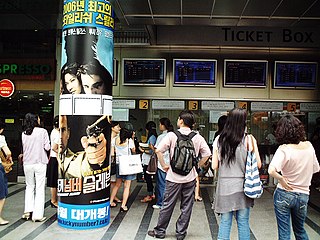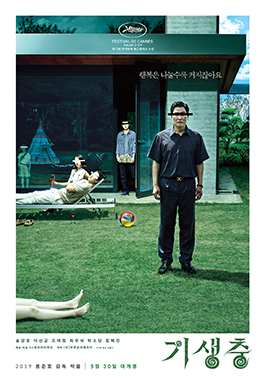
The term "Cinema of Korea" encompasses the motion picture industries of North and South Korea. As with all aspects of Korean life during the past century, the film industry has often been at the mercy of political events, from the late Joseon dynasty to the Korean War to domestic governmental interference. While both countries have relatively robust film industries today, only South Korean films have achieved wide international acclaim. North Korean films tend to portray their communist or revolutionary themes.

Shin Sang-ok was a South Korean filmmaker with more than 100 producer and 70 director credits to his name. His best-known films were made in the 1950s and 60s, many of them collaborations with his wife Choi Eun-hee, when he was known as "The Prince of South Korean Cinema". He received posthumously the Gold Crown Cultural Medal, the country's top honor for an artist.

Choi Eun-hee was a South Korean actress, who was one of the country's most popular stars of the 1960s and 1970s. In 1978, Choi and her then ex-husband, movie director Shin Sang-ok, were abducted to North Korea, where they were forced to make films until they sought asylum at the U.S. embassy in Vienna in 1986. They returned to South Korea in 1999 after spending a decade in the United States.

South Korean films have been heavily influenced by such events and forces as the Korea under Japanese rule, the Korean War, government censorship, the business sector, globalization, and the democratization of South Korea.
Dragon Lee is an actor and practitioner of Taekwondo and Hapkido. He made a name for himself as a martial arts film star in the 1970s and 80s. His birth name is Moon Kyung-seok, but he has also been called Keo Ryong in South Korea.

Jung is a Latin alphabet rendition of the Korean family name "정", also often spelled Jeong, Chung, Joung or Jong. As of the South Korean census of 2015, there were 2,407,601 people by this name in South Korea or 4.84% of the population. The Korean family name "정" is mainly derived from three homophonous hanja. 鄭 (2,151,879), 丁 (243,803) and 程 (11,683). The rest of the homophonous hanjas include: 政 (139), 桯 (41), 定 (29), 正 (22) and 情 (5).
This is a list of films by year produced in the country of South Korea which came into existence officially in September 1948. The lists of Korean films are divided by period for political reasons. For earlier films of united Korea see List of Korean films of 1919–1948. For the films of North Korea see List of North Korean films. For an A-Z list of films see Category:Korean films.
Park Chul-soo was a South Korean film director, producer, screenwriter and occasional actor. He was one of the most active filmmakers in Korean cinema in the 1980s and '90s.

Shin Seong-il was a South Korean actor, film director, producer, and former politician. A legendary actor with 500 films in over 40 years, Shin debuted in director Shin Sang-ok's 1960 film A Romantic Papa and rose to fame through popular youth titles. A star in the 1960s and 1970s, his status as one of Korea's top actors extended well into the 1980s.
Yu Ji-in is a South Korean actress active since 1974. She was born Lee Yun-hui in Seoul, South Korea in 1956 and received a bachelor's and master's degree in Theater and Film from Chung-Ang University. When she was a freshman at the school in 1974, she started her acting career after getting elected in a joint recruit held by the Yeonbang Film, and Weekly Hankook. From onwards to 1977, she appeared in one to three films per year and at the same time, she also acted as a TV actress affiliated to TBC TV. Yu was commonly referred to as "New Troika" or "Second Troika" along with her rival actresses, Jeong Yun-hui and Chang Mi-hee of the 1970s and 1980s after the "First Troika", Moon Hee, Nam Jeong-im, and Yoon Jeong-hee of the 1960s.
Won Mi-kyung is a South Korean actress. Won was born in Chuncheon, Gangwon, South Korea. She graduated from Seoul Girls' High School. Won is referred to as one of "The Troika of the 1980s" along with Lee Mi-sook, and Lee Bo-hee, all of whom dominated the screen of the period. Won's glamorous body attracted male audiences. After Won Mi-kyung won the Miss Lotte title in 1978, she started her acting career as a TV actress of TBC.
Hah Myung-joong is a South Korean actor, film director, producer, planner, and screenwriter. Hah started his career as an actor, but expanded his career to film directing, and film producing. Hah graduated from Kyung Hee University with a major in English literature. His brother Ha Gil-jong was a film director. His 1985 film Daengbyeot was entered into the 35th Berlin International Film Festival.
The Korea Creative Content Agency (KOCCA) is a South Korean government agency which is affiliated with the Ministry of Culture, Sports and Tourism and is charged with governing cultural content. As part of its partnership the Export-Import Bank of Korea, the agency provides loans for small companies producing cultural products such as TV shows, films, games and animated series.
Events from the year 1978 in South Korea.
Ha is a Latin alphabet rendition of the Korean family name "하", also often spelled Hah or less commonly as Har. As of the South Korean census of 2000, there were 213,758 people by this name in South Korea, or roughly 0.5% of the population.

Parasite is a 2019 South Korean black comedy thriller film directed by Bong Joon-ho, who co-wrote the screenplay with Han Jin-won and co-produced. The film, starring Song Kang-ho, Lee Sun-kyun, Cho Yeo-jeong, Choi Woo-shik, Park So-dam, Jang Hye-jin, Park Myung-hoon, and Lee Jung-eun, follows a poor family who infiltrate the life of a wealthy family.









